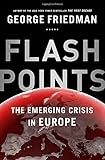I am leaving TWITTER SOON. Please continue to follow me here.
Book Review - Flashpoints: The Emerging Crisis in Europe
Want to understand why Europe matters in today's world? This book should be your first stop.
Book Information
Stratfor CEO George Friedman's latest book, "Flashpoints: The Emerging Crisis in Europe" focuses on the critical areas making headlines in today's Europe. I consider this a must read for anyone wanting a balanced analysis of the financial crisis in the EU, the emergence of Germany in the leading role on the continent and why Ukraine and the Russian incursion across soveriegn boarders matters. In fact it is a must read to understand the larger question of why Europe really matters in today’s world.
Author
George Friedman
Publisher
Doubleday
Publication Date
2015-01-27
ISBN
038553633X
George Friedman
Publisher
Doubleday
Publication Date
2015-01-27
ISBN
038553633X
Friedman is a geographer and this approach shapes much of the books view and conclusions–as it should. Reading Friedman is always a primer on how the placement of nations and peoples on this earth impact history. The little understood key of just where people have settled and is a little understood part of global politics.
Europe has always mattered in both ancient and modern world history. Friedman's focus is on the period from the age of exploration begun by Portugal and Spain that inaugurated European expansion from the fifteenth century forward. This part of the book I found the most fascinating and appropriately titled, "Europe's Assault on the World". If one section can summarize why Europe matters it is this along with this clear statement.
"No one is certain how many died through the direct impact of European imperialism, from military action, starvation, disease, and other causes. Some experts estimate 100 million dead over the course of four centuries of empire building, but no one really knows. The dead were drawn from a world population much smaller than exists today, making the price even more staggering. But so was the wealth extracted, accumulated, and put to work in Europe. When I walk the streets of London or Paris, the almost magical uses of the wealth Europe extracted from its empire can be seen in each building–or in a single street lamp. The price the world paid was enormous, but so were the possibilities created" (page 27).Could this be said of any other period or empire in history?
Europe has given the world the heights of civilization and depths of barbarity. It is a paradox both mysterious and rational. But I think Friedman puts his finger on both the geopolitical and spiritual map when he says his story is "...about the European obsession with the world, and its hunger to own it" (page 42). Friedman says his purpose is to deal with "the European obsession with possessing everything and where it comes from and where it leads to..." (page 42). In some ways it is Part One of this work that is most helpful to a student of Bible history and prophecy. Without intending, nor likely even believing, Friedman lays out a compelling case to show how Europe in its history and purposes form a narrative for the background for the Babylon of the Book of Revelation
Understanding the current European state is critically important in today's world. One cannot understand where this world is heading without an historical background to Europe both politically and spiritually. I tell my students they must understand why Europe matters in the modern world. Friedman explains the role of German resurgence and why it is the "indispensable nation" in Europe's present and future. He concludes his book with a chilling observation that Europe could easily return to it's historical ways. He says it is a fantasy to think that Europe has moved beyond using armed conflict to settle its problems.
"The Europeans are still human, and they will still encounter terrible choices like those that others face and that they have faced in the past. They will have to choose between war and peace, and as in the past, they will at times choose war" (page 258).Flashpoints should be considered a basic primer to understanding much about what is transpiring today in Europe. Europe continues to be a fascinating area to watch and understand.
Nobody has commented yet. Be the first to kick off the discussion!




No comments:
Post a Comment